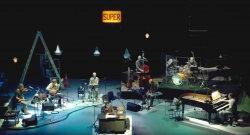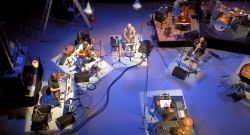François Sarhan : lead voice, text and music
Ictus :
Igor Semenoff : violin, Stroh-viol, voice
Dirk Descheemaeker : clarinet, bass clarinet, voice
Laurent Bômont : trumpet, bugle, voice
Jean-Luc Plouvier : keyboards, prepared piano, voice
Tom Pauwels : acoustic and electric guitar, voice
Géry Cambier : acoustic and electric bass, voice
Gerrit Nulens : drums, vibraphone, voice
Tom Bruwier : scenography
CD (audio excerpts HERE) :
Live recording, Opéra de Lille, by Alexandre Fostier, 26th of january 2008.
Mixed by Jean-Luc Plouvier at Alexandre Fostier’s.
Mastered by Jarek Frankowski at Acoustic Studio, Brussel.
Thanks to Michèle Paradon, Philippe Ranallo, Kaaitheater, Bozar, Opéra de Lille
"L'Nfer, un point de détail": this is an evening of pop with François Sarhan, created at the Metz Arsenal in 2006 where it caused quite a stir. Not exactly a show, but not a concert either. More a variety set in the shape of the Radio-Sarhan studio. The set offers up eight musicians and mikes, chamber music blended liberally with rock, computers, samples, words, bodies that speak, music that speaks. In a feverish, sarcastic atmosphere that evokes the heyday of experimental rock and seems to invoke the ghost of Zappa, a tight score explores in detail the rhythms, hesitations, pauses and resumptions of ordinary speech. And it is this ordinary speech that is the star of the show: the voice of narration, of the Dictaphone, of confession, of conversation. It inflicts its rhythm, modulates the phrasing, wakes up the writing.
It comes from various sources: pre-recorded voices (small girls, crowds, preachers), arrangements (Soft Machine, Frank Zappa), and original works by François Sarhan – with himself as the announcer.
It works by imitations, cover versions, free counterpoint (or remixes), all muddled together the way a radio programme on music news, or simply news, might be. The composer, like a radio presenter who has got the wrong studio, reels off a curious anecdote that refers to his own disappearance. And the music is off, following, splitting away, harmonising… From his laptop, Sarhan launches jingles that interrupt the flow or clash with what is being said. And then suddenly the curtain tears apart and Linda appears: she has sinned but she was a victim; she has met God and her confession will save her. This pastiche of religious shows by American television evangelists perfectly captures their words and sobs, conjuring up the obscene reality we now live in.

François Sarhan (b. September 30, 1972, Rouen).
Modern (Frankfurt), Ensemble Recherche, Ictus Ensemble, Ensemble Intercontemporain, Orchestre Philharmonique de Radiofrance, among others, have performed his works.
Mr. Sarhan has taught at IRCAM between 1998 and 2002, and at Marc Bloch University in Strasbourg since 1999. He wrote an History of Music (published in 2002 by Flammarion, Paris), and is the initiator of the artistic collective CRWTH , which is active in the perfor- mance of multimedia projects since 2000. He is also a visual artist, encyclopedist in a surrealistic way, and makes his own shows as a performer and stage director.
He recently collaborated with South African artist William Kentridge on a show called Telegrams from the Nose, presented more than 30 times all over Europe. He started directing himself his own produc- tions in 2008, and lastly made a King Lear, chamber opera, as composer, stage director and film maker. He recently opened his first exhibition in Johannesburg, initiating a new aspect of his art, with videos, collages and artist books. His next projects include a movie and a show produced by LOD, in Ghent, a compilation of the texts from his Encyclopedia, and a series of instrumental music works.
Het theater en de concertzaal voorbij, is L’Nfer eerder als ‘live-radio’ gedacht waarop negen muzikanten samen met de componist-acteur-dirigent-zanger dieper ingaan op politieke en muzikale actualiteit. Van kamermuziek tot progrock, met de nodige informatica, samples en veel stemmen die het muzikale verloop bepalen gaat het hier om alles behalve provocatie. Wel zijn de details belangrijk, de conversatie, het engagement alsof een en ander zich ’s avonds onder vrienden afspeelt. Desondanks blijft er naar het einde toe vooral een sfeer van vergankelijkheid hangen.
De bronnen zijn heel uiteenlopend: vooraf opgenomen stemmen (kinderen, predikanten), arrangementen van werken uit de experimentele rock (Soft Machine, Frank Zappa) én originele muziek van François Sarhan.
Dit alles volgt elkaar op zoals men op de radio het heeft over de muzikale of maatschappelijke actualiteit: met commentaar over wereldnieuws en weetjes allerhande (over de afschaffing van het principe van het voorgeborchte door Paus Benedictus XVI, de staat van de luchtvaart, “wordt gezocht” pamfletten op de muren in de Londense metro).
De voordracht is vastgelegd op het ritme en de beweging van een ietwat nerveuze spreker: een actieve dictie die uiteindelijk wordt in muziek omgezet. Dit gebeurt in imitaties, herhalingen, in een vrij contrapunt of in remix.
De bezetting: klarinet, trompet, gitaren, Hammond, viool, contrabas en basgitaar, drums, computer en stem.
Het geheel wordt zeer subtiel versterkt, belicht en geharmoniseerd.
L'Nfer, un point de détail : c'est la soirée pop-art de François Sarhan, créée à l'Arsenal de Metz en 2006, où elle avait fait polémique. Ni spectacle, ni pur concert. Mais un plateau de variétés : le studio Radio-Sarhan. Sur ce plateau, huit musiciens et des micros, de la musique de chambre librement mêlée à du rock, des ordinateurs, des échantillons, de la parole, des corps pris par la parole, de la musique prise par la parole. Dans une atmosphère fiévreuse et sarcastique, qui évoque les grandes heures du rock expérimental et semble invoquer le spectre de Zappa, une partition très serrée explore dans le détail les rythmes, hésitations, suspensions et reprises de la voix parlée ordinaire. La source musicale, ici, c'est l'énergie énonciative qui traverse un corps énervé; elle impose son rythme, module le phrasé, suscite l'écriture.
Les sources sont diverses : des voix préenregistrées (des petites filles, des prêcheurs), des arrangements du grand répertoire du rock expérimental (Soft Machine, Frank Zappa), et des pièces originales de François Sarhan - lui-même en speaker.
Cela fonctionne en imitations, en reprises, en contrepoint libre (ou remix) : tout cela est enchevêtré comme pourrait l'être un programme radiophonique sur l'actualité musicale, et sur l'actualité tout court. Le compositeur, comme un animateur radio qui se serait trompé de plateau, tire le fil d'une anecdote étrange qui en appelle à sa propre disparition. Et la musique se met en route, qui le suit, le dédouble, l'harmonise... Depuis son ordinateur portable, il lance les jingles qui interrompent le flux ou contredisent le propos. Mais voilà que tout se précipite, et qu'apparaît Linda : elle a péché, elle a rencontré Dieu, elle se confesse... pastiche des spectacles religieux des télé-évangélistes américains, calqués au mot près, au sanglot près, sur la réalité obscène qui est désormais la nôtre.
Watch & listen to this project

François Sarhan : L'Nfer, un petit détail
3 excerpts from "L'Nfer, un petit détail" (CD "Pop Up", MFA 2012)
1 video

